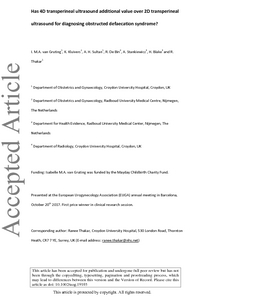van Gruting, IMA; Kluivers, K; Sultan, AH; De Bin, R; Stankiewicz, A; Blake, H; Thakar, R
(2018)
Does 4D transperineal ultrasound have additional value over 2D transperineal ultrasound for diagnosing posterior pelvic floor disorders in women with obstructed defecation syndrome?
Ultrasound Obstet Gynecol, 52 (6).
pp. 784-791.
ISSN 1469-0705
https://doi.org/10.1002/uog.19105
SGUL Authors: Sultan, Abdul Hameed
![[img]](https://openaccess.sgul.ac.uk/110122/1.hassmallThumbnailVersion/Gruting_et_al-2018-Ultrasound_in_Obstetrics_%2526_Gynecology.pdf)  Preview |
|
PDF
Accepted Version
Available under License ["licenses_description_publisher" not defined].
Download (1MB)
| Preview
|
Abstract
Objective
To establish the diagnostic test accuracy of two‐dimensional (2D) and four‐dimensional (4D) transperineal ultrasound (TPUS) for diagnosis of posterior pelvic floor disorders in women with obstructed defecation syndrome (ODS), in order to assess if 4D ultrasound imaging provides additional value.
Methods
This was a prospective cohort study of 121 consecutive women with ODS. Symptoms of ODS and pelvic organ prolapse on clinical examination were assessed using validated methods. All women underwent both 2D‐ and 4D‐TPUS. Imaging analysis was performed by two blinded observers. Posterior pelvic floor disorders were dichotomized into presence or absence, according to predefined cut‐off values. In the absence of a reference standard, a composite reference standard was created from a combination of results of evacuation proctography, magnetic resonance imaging and endovaginal ultrasound. Primary outcome measures were diagnostic test characteristics of 2D‐ and 4D‐TPUS for rectocele, enterocele, intussusception and anismus. Secondary outcome measures were interobserver agreement, agreement between the two imaging techniques, and association of severity of ODS symptoms and degree of posterior vaginal wall prolapse with conditions observed on imaging.
Results
For diagnosis of all four posterior pelvic floor disorders, there was no difference in sensitivity or specificity between 2D‐ and 4D‐TPUS (P = 0.131–1.000). Good agreement between 2D‐ and 4D‐TPUS was found for diagnosis of rectocele (κ = 0.675) and moderate agreement for diagnoses of enterocele, intussusception and anismus (κ = 0.465–0.545). There was no difference in rectocele depth measurements between the techniques (19.9 mm for 2D vs 19.0 mm for 4D, P = 0.802). Interobserver agreement was comparable for both techniques, although 2D‐TPUS had excellent interobserver agreement for diagnosis of enterocele and rectocele depth measurements, while this was only moderate and good, respectively, for 4D‐TPUS. Diagnoses of rectocele and enterocele on both 2D‐ and 4D‐TPUS were significantly associated with degree of posterior vaginal wall prolapse on clinical examination (odds ratio (OR) = 1.89–2.72). The conditions observed using either imaging technique were not associated with severity of ODS symptoms (OR = 0.82–1.13).
Conclusions
There is no evidence of superiority of 4D ultrasound acquisition to dynamic 2D ultrasound acquisition for the diagnosis of posterior pelvic floor disorders. 2D‐ and 4D‐TPUS could be used interchangeably to screen women with symptoms of ODS.
| Item Type: |
Article
|
| Additional Information: |
This is the peer reviewed version of the following article: van Gruting, I. M., Kluivers, K. , Sultan, A. H., De Bin, R. , Stankiewicz, A. , Blake, H. and Thakar, R. (2018), Does 4D transperineal ultrasound have additional value over 2D transperineal ultrasound for diagnosing posterior pelvic floor disorders in women with obstructed defecation syndrome?. Ultrasound Obstet Gynecol, 52: 784-791, which has been published in final form at https://doi.org/10.1002/uog.19105. This article may be used for non-commercial purposes in accordance with Wiley Terms and Conditions for Use of Self-Archived Versions. |
| Keywords: |
Transperineal ultrasound, diagnostic accuracy, enterocele, four-dimensional, obstructed defaecation syndrome, rectocele, two-dimensional, Obstetrics & Reproductive Medicine, 1114 Paediatrics And Reproductive Medicine |
| SGUL Research Institute / Research Centre: |
Academic Structure > Institute of Medical, Biomedical and Allied Health Education (IMBE) |
| Journal or Publication Title: |
Ultrasound Obstet Gynecol |
| ISSN: |
1469-0705 |
| Language: |
eng |
| Publisher License: |
Publisher's own licence |
| PubMed ID: |
29882224 |
| Dates: |
| Date |
Event |
| 2018-12-05 |
Published |
| 2018-06-08 |
Published Online |
| 2018-05-13 |
Accepted |
|
 |
Go to PubMed abstract |
| URI: |
https://openaccess.sgul.ac.uk/id/eprint/110122 |
| Publisher's version: |
https://doi.org/10.1002/uog.19105 |
Statistics
Item downloaded times since 06 Sep 2018.
Actions (login required)
 |
Edit Item |



